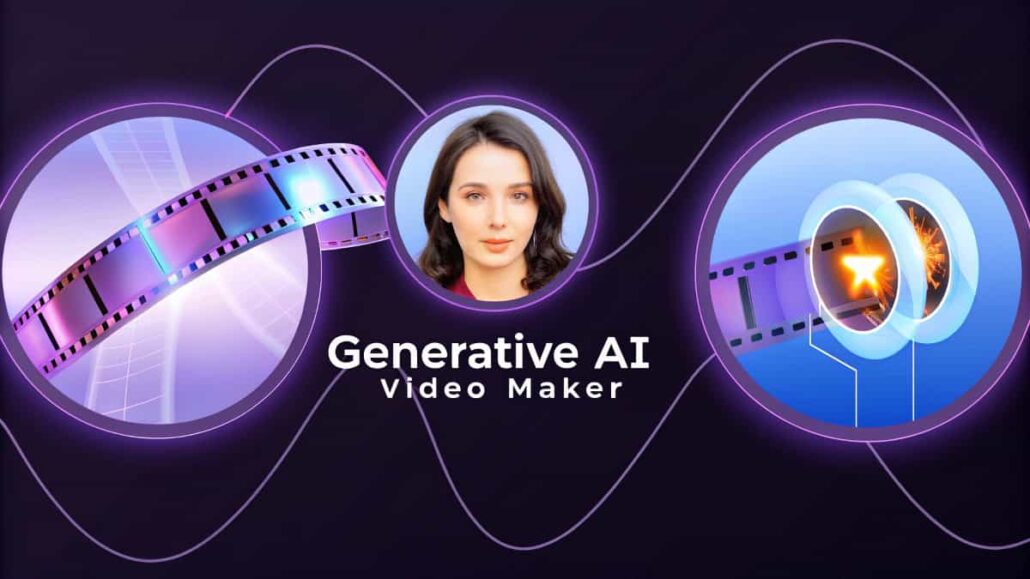
Video has taken over the online world, with businesses using it for everything from ads to tutorials. In fact, companies that embrace video usually grow their revenue almost fifty percent faster than those that stick to text and images. Yet, making high-quality clips still demands pricey cameras, editing know-how, and hours of work.
That is where generative AI video makers step in. These smart tools turn simple text prompts into finished, eye-catching videos in just a few minutes. By lowering costs and skill barriers, they open the door to small businesses, solo creators, and marketers who could once only dream of pro-level production.
This guide breaks down how these platforms work, highlights the must-have features, and helps you find the best fit for your goals.
What Are Generative AI Video Makers?
Generative AI video makers are online apps that use artificial intelligence to build videos from words, pictures, or other inputs you provide. Instead of dragging and dropping clips like old-school editing software, these programs automatically assemble scenes, animate graphics, add voiceovers, and sprinkle on special effects based entirely on your directions.
The tech behind AI video tools pulls together a few smart features:
- Natural language processing helps the system read and interpret your text prompts.
- Computer vision either produces new images or picks the right clips for your story.
- Machine-learning algorithms add slick transitions and special effects automatically.
- Text-to-speech engines give you natural voiceovers without a studio actor.
Key Benefits of AI Video Generation
Speed and Efficiency
Making a video the old way can take weeks, even months, from planning to final cut. An AI tool can crank out a finished clip in just a couple of hours-or even minutes. That lightning speed lets you test multiple versions and fine-tune your message on the fly.
Cost Reduction
Hiring a production crew, renting cameras, booking a studio, and paying talent usually racks up a bill in the thousands. Because AI does much of the heavy lifting, you avoid most of those line items. Most platforms now offer monthly subscriptions that cost less than one day with a freelance videographer.
Accessibility for Non-Experts
You dont have to be a video whiz to use these tools. Friendly drag-and-drop interfaces let a simple text prompt turn into a full video scene. This ease-of-use opens the door for marketers, small-business owners, and solo creators who want to tell stories without a steep learning curve.
Consistent Quality
Because AIs follow the same training data, every clip stays on-brand in look and feel. That uniform quality protects your companies image and saves hours of manual correction. With this level of consistency, you can focus more on the message and less on chasing small visual details.
Scalability
With the right video maker, you can pump out dozens of clips for new products, seasonal campaigns, or niche audiences without the hours (and dollars) stacking up. That elasticity matters a lot to e-commerce brands and solo creators who thrive on fresh video content.
Essential Features to Look For
Text-to-Video Capabilities
Pick a platform that reads your detailed prompt and spins it into spot-on visuals. Top tools grasp context, tone, and style, turning words into scenes almost as if a human director was behind the camera.
Template Library
A rich library of templates cuts the setup grind and gives you a polished starting point. Just make sure the designs align with your industry, brand vibe, and the message you want each video to send.
Customization Options
Templates lay the groundwork, but real personalization comes from these tweaks:
- Color palette adjustments
- Font selection
- Logo integration
- Music and sound effect libraries
- Transition styles
Voice and Audio Generation
Solid text-to-speech with diverse voices, accents, and languages broadens who can hear your message. A few services also whip up custom tunes or pack in a wide library of copyright-safe music tracks.
Export Quality and Formats
Check that the tool exports in the right resolution and file type for every outlet-whether that’s TikTok, a business website, or a sales presentation.
Integration Capabilities
Before you pick a video-making tool, ask how easily it slides into your current process. Check whether it hooks up smoothly with the social networks, marketing apps, or content management systems you already use.
Popular AI Video Maker Platforms
If you need slick avatar videos for training, classrooms, or big company announcements, Synthesia should be on your radar. Its lifelike avatars can read your script in dozens of languages, making global edits a breeze.
Best for: Corporate briefings, onboarding clips, study materials
Key strength: Realistic avatars plus rich language choices
Pictory shines when you want to turn long blog posts or detailed articles into sharp video teasers. The AI scans your text, picks out the highlights, and pairs them with fitting images on its own.
Best for: Content teams, bloggers, teachers
Key strength: Automatic slide-to-video magic from written pieces
Lumen5
Focused on social feeds, Lumen5 serves up templates already sized and styled for TikTok, Facebook, and others. You can tweak every detail, yet the layout stays easy even for first-time users.
Best for: Social strategists, freelancers, small shops
Key strength: Platform-ready designs plus drag-and-drop ease
Runway ML
Runway ML is for designers and filmmakers who want to push boundaries. With cutting-edge tools and test features, it lets you play with AI models that are still in the lab, perfect for bold concepts.
Best for: Creative studios, indie filmmakers
Key strength: Experimental tools and real-time editing in one place
Best for: Creative professionals, anyone who loves to experiment with video .
Key strength: Powerful AI tools and room to play with ideas .
Choosing the Right Platform for Your Needs
Define Your Use Case
Every video platform shines in certain areas. Ask yourself why you want to make the video:
- Marketing videos: Search-for services that let you tweak colors, logos, and text
- Educational content: Pick ones with clear voice-over options and ready-made slide patterns
- Social media: Grab tools that auto-fit clips for Instagram, TikTok, or YouTube
- Corporate comms: Seek polished templates plus avatar choices dressed for business
Evaluate Your Technical Comfort Level
Some apps work out of the box; others ask you to tinker. If gadgets make you nervous, go for clean menus and step-by-step guides. Savvy users can hunt for deeper buttons, scripts, and API links.
Consider Your Budget
Prices swing from free to premium. Check:
- what you pay each month or year
- limits on minutes or a fee for each video exported
- extra charges for voice packs, stock clips, or higher-resolution files
- lower-quality downloads on free accounts
Test Before Committing
Almost every service lets you sign up with no money down. Spend an afternoon running real projects through three or four to see:
- Does the video look sharp?
- Can I navigate without getting lost?
- Do the templates match my style or feel outdated?
- When I ask a question, do they reply within a few hours?
Assess Scalability Needs
Finally, think ahead. If you plan to churn out hundred-plus clips a month, some services give bulk discounts or easy team seats. Look for exit clauses too, in case your project shrinks instead of expands.
Best Practices for AI Video Creation
Write Clear, Detailed Prompts
What you feed an AI often shapes what it gives you. To get rich, polished clips, stack up precise details in your prompt, like:
- Visual style (cartoon, realistic, retro)
- Mood and tone (funny, serious, inspiring)
- Who will watch (teens, professionals, parents)
- Main takeaways (brand message, call to action)
- How long it should run (15 seconds, 1 minute)
Maintain Brand Consistency
Craft repeating templates that echo your logo, colors, and fonts. Leaning on the same presets makes viewers spot your brand at a glance.
Optimize for Your Platform
Every channel-from TikTok to YouTube-has its own video recipe. Match each upload to that sites size, length, and vibe for the best reach.
Add a Human Touch
AI can build the backbone, but a personal voice, custom pictures, or warm greetings push engagement to the next level.
Monitor Performance
Keep an eye on likes, shares, and watch time. Compare AI clips with hand-made ones, learn from the numbers, then tune your next round.
Common Challenges and Solutions
Generic-Looking Content
Obstacle: Excessive sameness makes many AI videos feel cookie-cutter.
Fix: Spend extra minutes tweaking scenes, drop in your own shots, and mix tools for a fresher look.
Limited Creative Control
Obstacle: AIs sometimes miss the mark, twisting your vision in strange ways.
Fix: Rewrite the prompt a few times, try several drafts, then blend results with manual editing until it clicks.
Quality Inconsistency
Challenge: You might notice the quality of the videos can change depending on the prompt you supply, or even the type of content you ask for.
Solution: Build a set of reliable prompt templates for your favorite tool and always give each video a quick review before sending it live.
The Future of AI Video Creation
AI video tech is upgrading faster than ever. The newest trends look like this:
- More lifelike avatars and voices
- Deeper understanding of complicated prompts
- Real-time data feeds mixed straight into clips
- Easier tweaks for colors, moods, and styles
- Cheaper plans and quicker render times
Taken together, these upgrades will put high-quality video in the hands of more businesses and creators.
Taking Your First Steps with AI Video Generation
Generative AI video tools change the game by cutting old roadblocks out of the production process. With the right setup, you can make studio-grade clips without a big crew or fancy gear. To get there, start by picking the platform that matches your workflow and the job at hand.
First, write down what you want each video to do. Then test a few services during their free trial windows to see which one fits your budget and style. Finally, invest time in really mastering that one tool before spreading your attention to others.
When you dive into making AI-powered videos, youre not handing off all the work to a machine. The software takes care of the heavy lifting, yet your ideas and knowledge of your brand steer the whole project forward.
So, how do you kick-start a smarter video strategy? Pick a tool that fits your goals, tackle a small project to gain confidence, and once that feels easy, branch out and explore more advanced features at your own pace.

